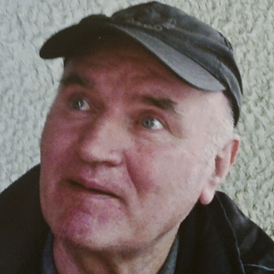Mladic spends first night in custody for war crimes
Former Bosnian Serb general Ratko Mladic, flown to Rotterdam on Tuesday to face a war crimes tribunal in The Hague, has spent his first night in custody.
The Belgrade court took just hours on Tuesday to make its decision to extradite Mladic after receiving appeal papers from the former army leader earlier in the afternoon.
Mladic is charged by the tribunal for atrocities committed by Serb forces during the 1992-95 Bosnian war.
The former commander is accused of genocide during the four year siege of Sarajevo, and of ordering the massacre of 8,000 Muslim men and boys in Srebrenica.
Watch: Alex Thomson's exclusive interview with Ratko Mladic - filmed shortly before he went into hiding
His lawyers argued he was too ill to travel to the court in the Netherlands, saying he had suffered a number of strokes and had a paralysed arm.
Milos Saljic, representing Mladic, said he was not mentally and physically fit to stand trial and asked for a team of doctors to examine his client.
But doctors who examined him on Friday said he was fit enough to be extradited.
Mladic, who was found in alone in a cousin’s farmhouse north of Belgrade, was able to hide for 16 years, holding back Serbia’s progress in joining the EU.
Read more: Who is Ratko Mladic?
His son Darko Mladic said on Sunday that his father insists he “had nothing to do with” the Srebrenica massacre and had in fact saved lives.
On Tuesday morning, Mladic was allowed on a police-escorted visit to the Belgrade grave of his daughter Ana, who committed suicide in 1994.
The 23-year-old reportedly shot herself with her father’s favourite pistol after she read about his alleged crimes in a magazine.
Ethnic divisions
Around 10,000 Bosnian Serbs pledged support for their wartime commander in the Serb Republic’s capital Banja Luka, a sign of the country’s deep ethnic divisions.

Buses arrived from across the Serb Republic, many filled with his former soldiers bearing his photo.
“There are more Mladics in Serbia, they grow and will continue where he stopped,” Srdjan Nogo of the ultra-nationalist organisation Srpske Dveri from Belgrade told the crowd.
The crowd also criticised Serbia’s President Boris Tadic, who many Serbs now see as a traitor because he gave the green light for Mladic’s arrest. “Boris, kill yourself, save Serbia,” they chanted.
After the war, Bosnia was split into a Serb Republic and a federation of Muslims known as Bosniaks and Croats under a weak central government.
While Serbs see Mladic as the Serb defender, Bosnian Muslims think of him as a ruthless military commander who ordered mass killings across the Balkan country during a war that killed more than 100,000, most of them Muslims.
“I cannot believe these people are glorifying Ratko Mladic today and show no empathy for deaths of thousands of victims that Mladic is responsible for,” said Edina Ramulic, the head of the Izvor organisation of families of killed and missing people from the northwestern Prijedor area.
“It really hurts and I also feel fear and discomfort as such a rally shows that we are going back to the 1990s,” she said.
Read more: Mladic, another step towards an international rule of law?